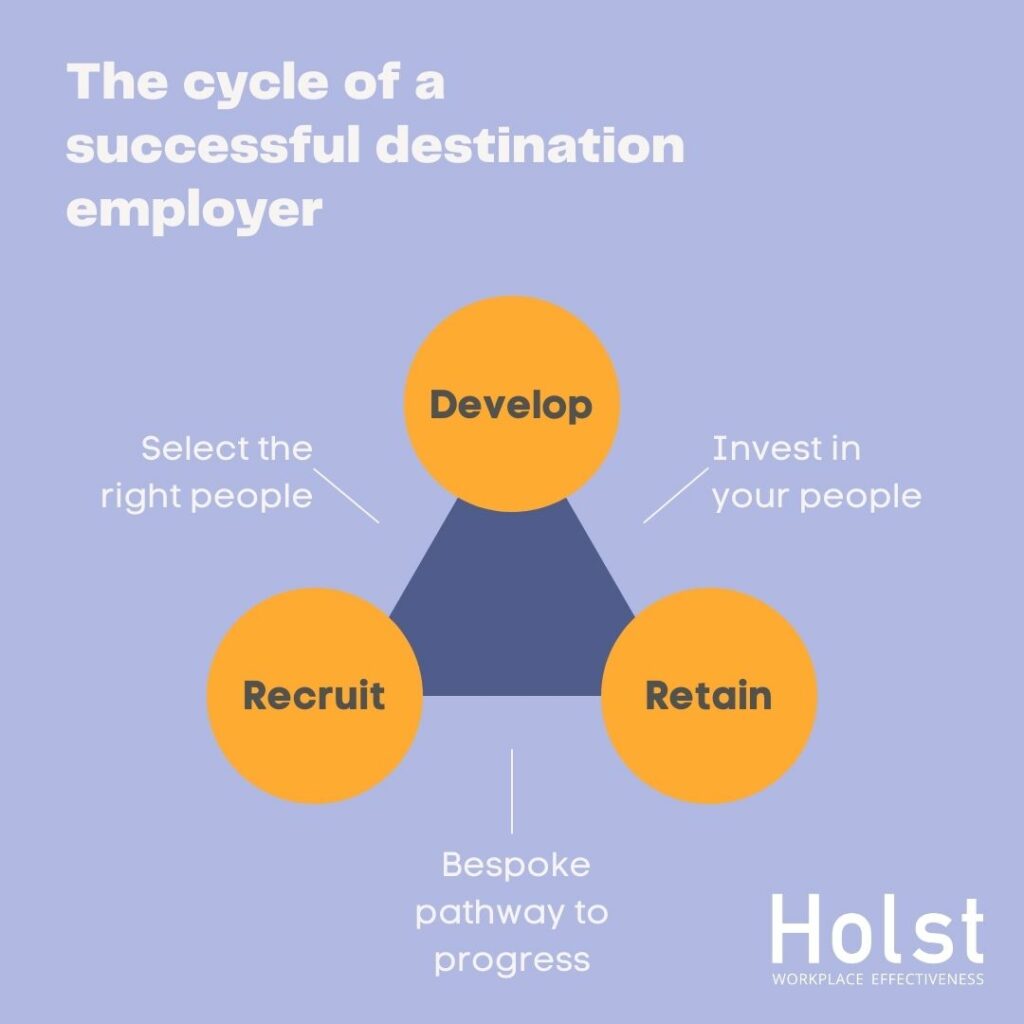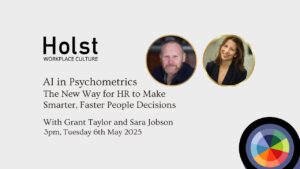Set your sights high. Be the destination employer everyone wants to work for.
From quiet quitting to the great resignation, the outlook on talent retention might appear bleak. But it doesn’t have to be that way. Over the years have you scanned the annual top 100 UK companies to work for and (a) wished your organisation was one of them? Or (b) wished that you worked for one of them? Then swiftly dismissed it as a lost cause?
Any organisation can be a top/destination employer. This goal is entirely within the gift of its leaders. Yes, there is an element of financial investment, but the real investment is in the value your organisation places on its people. At every level.
What is a destination employer?
A destination employer is one who is at the top of everyone’s working wish list. A workplace that is both physically and psychologically safe. It is an environment where success is valued alongside, and most definitely not at the expense of, the well-being of the people within it. Pre-pandemic, organisations may have been able to paper over the cracks with ubiquitous pool tables, playground slides and promises of big bonuses. But this came at a price. Employees would find themselves always on call, working extreme hours in the pursuit of the golden bonus and at the mercy of equally overstretched leaders. It wasn’t worth it then but it’s taken a pandemic for many to decide that enough is enough.
Which brings us back to the phenomena of quiet quitting and the great resignation. Organisations can choose to see this as a crisis against which they batten down the hatches and retreat into established routines of recruitment swiftly followed by attrition. Or they can choose an alternative path, break with tradition, think differently and look beyond standard tick-box requirements to fill roles. This is a valuable opportunity to create new and sustainable ‘pathways to progress’ for their people.
There is more data than ever before to show what the workforce wants. We can see that financial reward, while still hugely important, is matched by or even surpassed by the quality of the workplace and career prospects. A recent study concluded that the vast majority (86%) of employees said they were more productive at work if there was a good culture, while 85% said there was a link between workplace culture and wellbeing. People want – actually they demand – to be treated well. Organisations simply cannot afford to ignore the power shift.
Gen Z workers who did not see career advancement at their current company would job hop after an average of 1.7 years. Almost a third (30%) said they would leave a dead-end role in four months.
People Management, 21 September 2022
Create the building blocks of a destination employer
Think of the foundations of the destination employer in three phases.
Recruitment into development
Select the right people through assessments and follow a hiring process that reaches out to and encourages even the most passive of candidates.
Match that effort in your onboarding from the point of offer and through the following months.

Development into retention
Invest in your people. Identify, train and regularly review those who bring the best of themselves to work. This could be at any level of your organisation, not just at board level. Remember, your receptionist might be a new prospect’s first contact with your organisation. If this person is their first human impression of you, you had better be sure that s/he absolutely nails the role.
Retention into (internal) recruitment
So now you know who you need to keep, set in motion a bespoke pathway to progress. This is where walking the walk of the destination employer gets real. Up until this point, poor employers can get away with empty promises, a team golf day and a John Lewis voucher at Christmas. But all this wears thin if management is substandard, there is no clear pathway for progression or the workplace culture is toxic.
You need to know what your people want from their job, now and in the future. Question: what is it that really motivates them? Traditionally, promotion is equated with people management and climbing their potential pathway to career progression. They need to be recognised and appropriately rewarded for their contribution to avoid them being among the 40% reportedly planning to leave their jobs within the next year. Provocation (#deBono): could these people actually be more valuable than the leaders who manage them?
"Rethinking the structure of organisations and allowing people who are really good at a technical thing to stay away from human beings and do their thing - whatever it is - I think that's the future."
Cary Cooper, professor of organisational psychology and health at the University of Manchester.
Create the solution with Holst
Becoming a destination employer depends on how well you recruit, develop and retain the people and the skills that your organisation needs. At Holst, we help organisations across the UK and the world to deploy effective development programmes which create healthy workplace cultures. With psychological safety at the heart of your organisational culture, you’ll find it easier to attract the right talent, be successful in your offer to them and retain them through the employee life-cycle.
Talk to us about the challenges your organisation currently faces and take the first step to creating the solution.






